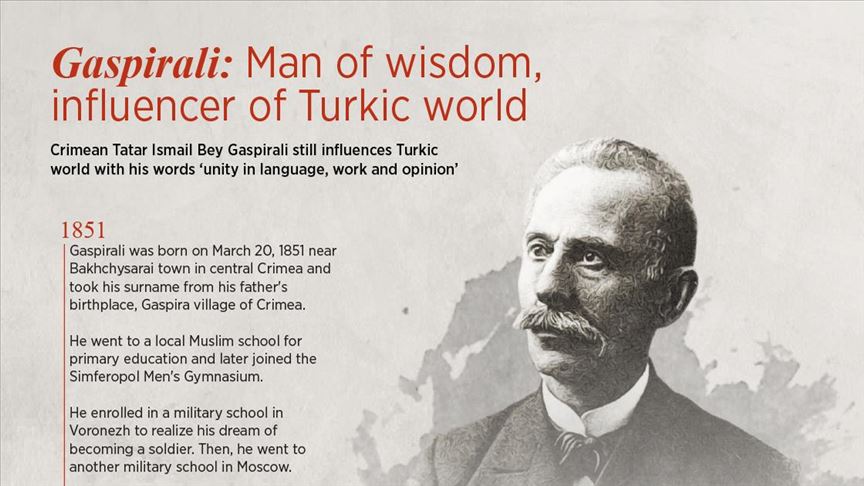
BAKU
Ismail Bey Gaspirali, also known as Gasprinski, still influences the Turkic world on the 105th anniversary of his death.
He guided Turkic communities with his words "unity in language, work and opinion".
He is one of the pioneers of the unity of Turkic world and left a mark with his works in print media and education.
Gaspirali was born on March 20, 1851 in Avcikoy village near Bakhchysarai town in central Crimea and took his surname from his father's birthplace, Gaspira village of Crimea.
He went to a local Muslim school for primary education and later joined the Simferopol Men's Gymnasium.
He enrolled in a military school in Voronezh to realize his dream of becoming a soldier. Then, he went to another military school in Moscow.
His life as a military student ended due to his efforts to join the Ottoman army which was fighting against the Greek rebels in Crete rebellion.
Gaspirali returned to Bakhchysarai in 1868 when he was 17 years old and started teaching Russian language.
In 1872, he went to Paris where he worked as an assistant to famous Russian literary writer Ivan Turgenev.
Two years later, he moved to Istanbul and returned to Crimea the year after.
He served as Bakhchysarai mayor from 1878-1884 and started publishing in order to propagate the voice of Turkish speaking nations to the world and create a national awakening.
Gaspirali, especially wrote on Russian Muslims, and made great efforts to carry out educational reforms in the Turkish and Muslim communities.
According to Gaspirali, Turkish education should be provided in schools and a common Turkish literary language should be created.
In addition, a national press was needed as a platform for communication between Turkish speaking communities.
With this aim, Gaspirali got permission from Russian authorities after intense efforts and started newspaper Tercuman, or Translator, on April 22, 1883.
The newspaper was written in Ottoman Turkish and it also included words from Tatar and other Turkic languages. The newspaper started as a weekly, but then went on to become a biweekly in 1903 and a daily in 1912.
Tercuman was the first Turkish newspaper issued in Crimea and the third one among the Russian Muslims.
Tercuman preserved its place as the only Turkish and Muslim newspaper in the Czarist Russia for a long time.
It achieved a great effect in the Turkic world. Despite its limited circulation, it became one of the newspapers that was frequently read by intellectuals in the Ottoman lands, Iran, the Balkans and Caucasia, as well as Russia.
Education reformer Gaspirali
Gaspirali opened a school which used improvised teaching methods in Bakhchysarai’s Kaytaz Aga neighborhood in 1884.
Reading, writing and other courses were taught with an easy and practical approach at the school. This method was a revolution for Muslim schools in Czarist Russia.
According to Gaspirali, the education system should primarily teach the mother tongue, and balance worldly knowledge with religious education.
The system, which he named as Usul-i-Jadid, became widespread later on and the number of these schools rose to over a hundred in the Russian Empire in 1895. In 1914, the number was nearly 5,000.
He was also a pioneer for the education of Turkish Muslim girls. He encouraged his sister Pembe Bolatukova to open the first Usul-i Jadid girl’s school in Bakhchysarai in 1893.
The first women’s journal, Alem-i Nisvan (World of Women), of Russian Turks started publications in 1905 under the auspices of Gaspirali and management of his daughter Sefika Gaspirali.
The first children’s journal among the Turks in Russia was also published during that time in Bakhchysarai. The Alem-i Sibyan (World of Children) was published in March 1906.
Gaspirali died on Sept. 24, 1914 in Bakhchysarai due to worsening health condition.
He was buried near the mausoleum of Haci Giray Khan, the founder of the Crimean Khanate.
‘Unity in language, work, opinion’
His words “unity in language, work, opinion” still continue to enlighten the path of the Turkic world.
*Writing by Havva Kara Aydin and Sena Guler
Anadolu Agency website contains only a portion of the news stories offered to subscribers in the AA News Broadcasting System (HAS), and in summarized form. Please contact us for subscription options.


